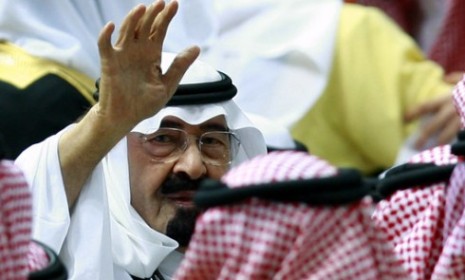Arab uprisings: Is Saudi Arabia next?
King Abdullah is showering his people with cash and releasing political prisoners to stave off protests. What if it doesn't work?

A free daily email with the biggest news stories of the day – and the best features from TheWeek.com
You are now subscribed
Your newsletter sign-up was successful
Saudi Arabia's royal family is so entrenched that the oil-rich kingdom it rules bears the family name. But that doesn't make the House of Saud immune to the wave of anti-government protests roiling the region. Already there are reports of protests in the oil-producing Eastern Province, and a planned March 11 "day of rage" is gaining steam on Facebook. Could Saudi Arabia be the next Arab government to fall?
Saudi Arabia can weather this storm: Saudi leaders are clearly nervous, and with good reason, says Rachel Bronson in The Washington Post. But they probably "won't find themselves confronting revolutionaries at their own doorstep." Loyal family members head the security forces, there's no organized opposition, and the rich king has "goodies to spread around" to pacify the masses.
"Could the next Mideast uprising happen in Saudi Arabia?"
The Week
Escape your echo chamber. Get the facts behind the news, plus analysis from multiple perspectives.

Sign up for The Week's Free Newsletters
From our morning news briefing to a weekly Good News Newsletter, get the best of The Week delivered directly to your inbox.
From our morning news briefing to a weekly Good News Newsletter, get the best of The Week delivered directly to your inbox.
"Bribery" won't save the royal family: King Abdullah is in denial if he "thinks he can buy off protests with the promise of gifts," says Mai Yamani in The Guardian. The fledgling protests, especially those driven by internet-savvy Saudi youths, aren't just "petulant cries to be silenced with bribes and bread and circuses," but "demands for dignity and a genuine voice in government." If young protesters flood the streets on March 11, all bets are off.
"Why a king's ransom is not enough for Saudi Arabia's protesters"
If Saudi Arabia does fall, we're in trouble: "If the revolution is going to stop anywhere, it is likely to be in the desert at the gates of the House of Saud," says Fawaz Gerges in The Independent. Handing out cash may not be pretty, but it's a "tried and tested method of keeping dissent at bay." So Saudi Arabia "probably won't fall" — but if it does, we're in for a "devastating" spike in oil prices, and "an earthquake across the world economy."
"Saudi probably won't fall, but if it does the world will change"
A free daily email with the biggest news stories of the day – and the best features from TheWeek.com